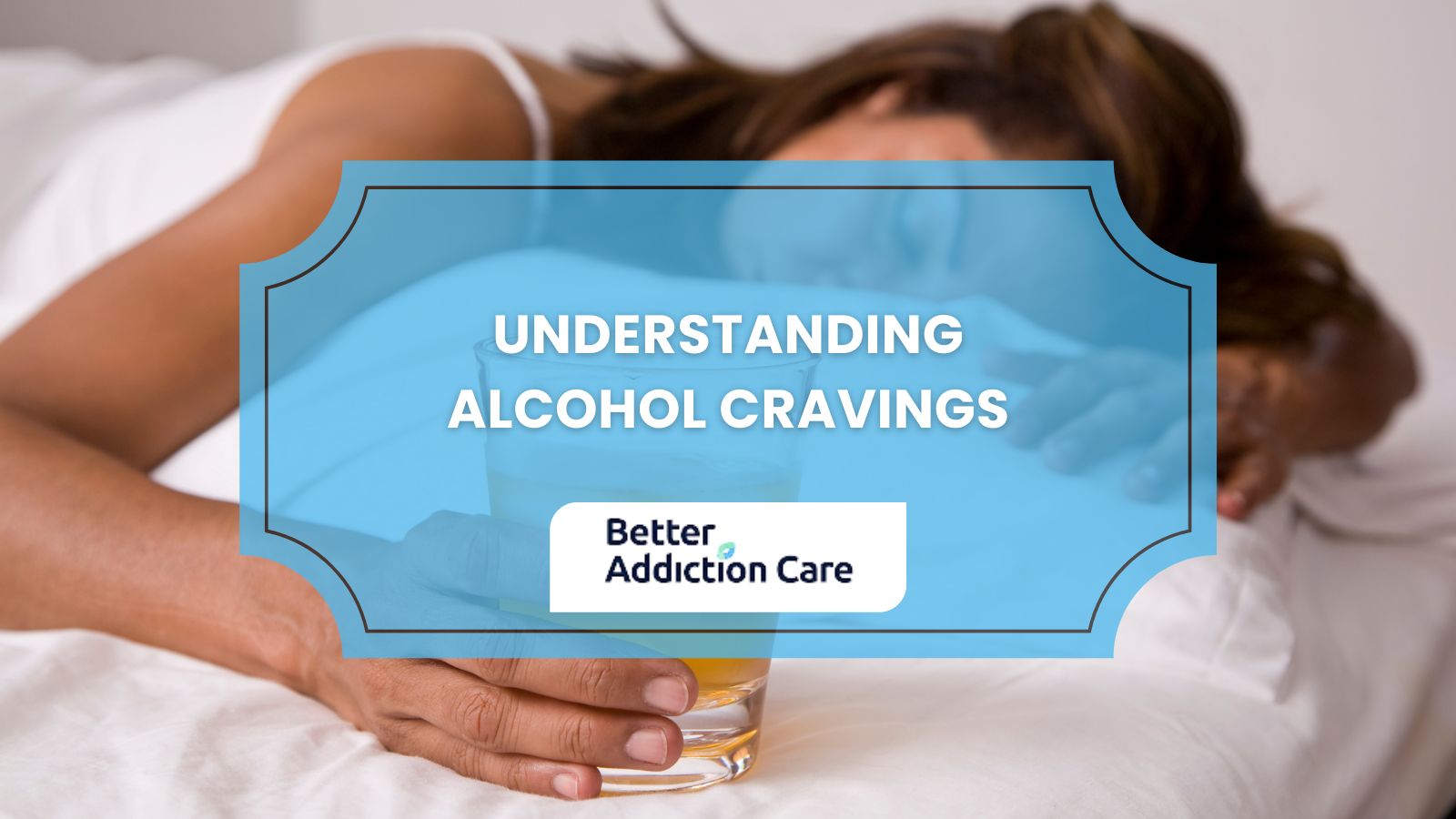Alcohol Withdrawal: Side Effects, Symptoms, Diagnosis and treatment
Side effects of alcohol withdrawal include tremors, nausea, headaches, sweating, mood swings, fatigue, and altered skin sensations. These symptoms affect your body and mind in serious ways, creating physical discomfort, emotional disturbances, and dangerous neurological complications. According to a 2024 study published in JAMA Network Open, alcohol withdrawal syndrome leads to 169 hospitalizations per 100,000 people annually in the US, with rates reaching 9-11% of all hospitalizations among men aged 30-49.
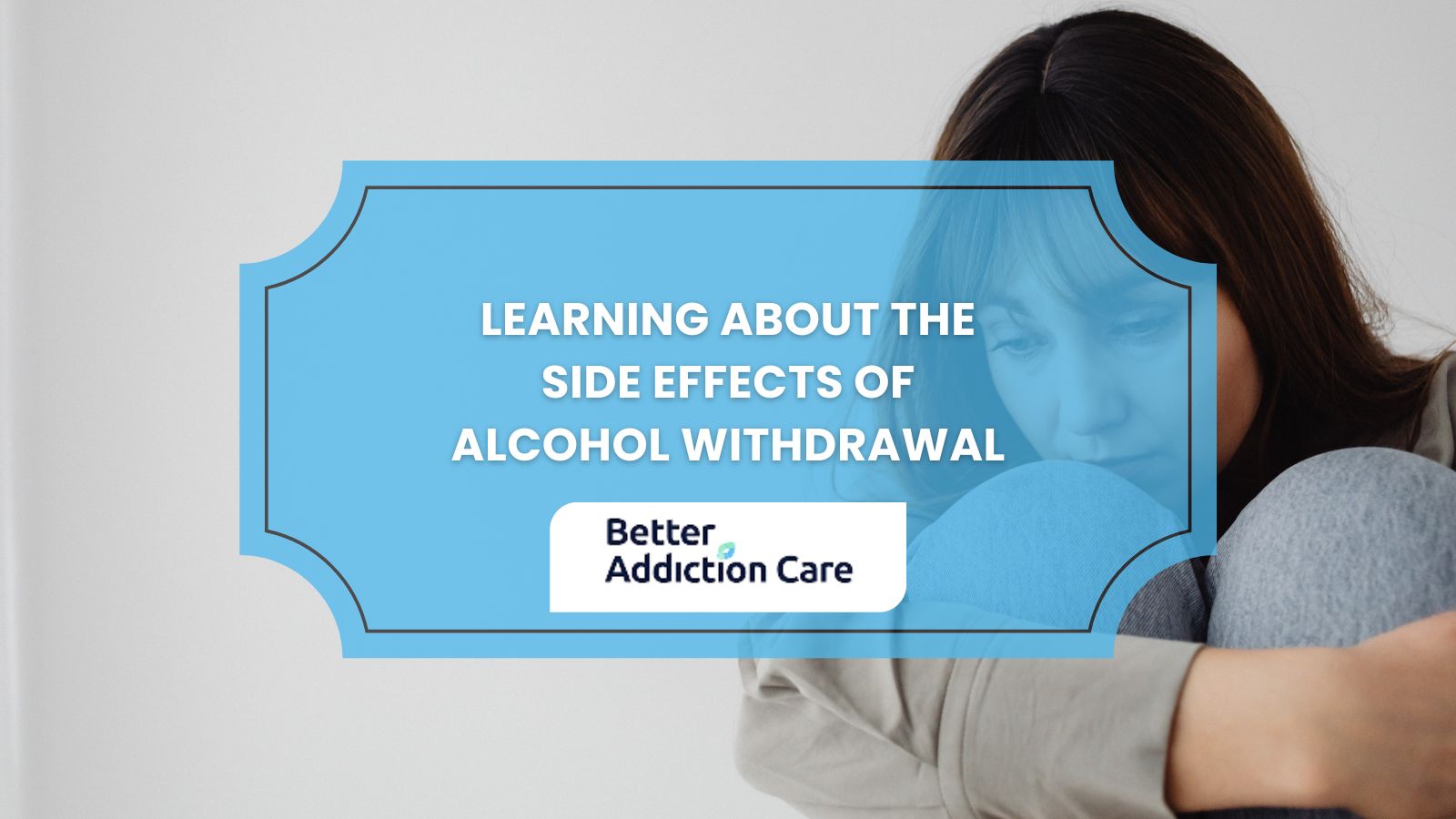
Side effects of alcohol withdrawal include tremors, nausea, headaches, sweating, mood swings, fatigue, and altered skin sensations. These symptoms affect your body and mind in serious ways, creating physical discomfort, emotional disturbances, and dangerous neurological complications. According to a 2024 study published in JAMA Network Open, alcohol withdrawal syndrome leads to 169 hospitalizations per 100,000 people annually in the US, with rates reaching 9-11% of all hospitalizations among men aged 30-49.
Symptoms escalate rapidly without proper care. What starts as these initial effects quickly progresses to anxiety, insomnia, elevated heart rate, and seizures. In severe cases, life-threatening delirium tremens involving hallucinations and disorientation occurs.
The risks don't end there. Post-acute withdrawal symptoms persist after repeated episodes, compounding medical dangers. This is why medical supervision isn't optional. It's essential for safely navigating withdrawal and preventing fatal outcomes.
What Are The Side Effects of Alcohol Withdrawal?
Alcohol withdrawal side effects include physical discomfort, emotional disturbances, neurological issues, and potentially life-threatening conditions. Symptoms also involve headaches, tremors, anxiety, mood changes, seizure risks, hallucinations, extreme fatigue, unusual skin sensations, and worsening severity with repeated episodes.
Listed below are 9 side effects of alcohol withdrawal.
- Physical Discomfort: Alcohol withdrawal causes headaches, tremors, sweating, nausea, vomiting, rapid heartbeat, and increased blood pressure. These physical reactions result from the body adjusting to the absence of alcohol.
- Psychological Distress: Anxiety, irritability, mood swings, confusion, and insomnia arise during withdrawal. These symptoms create significant emotional strain and affect overall well-being.
- Seizures: Withdrawal triggers generalized tonic-clonic seizures within 12 to 48 hours after stopping alcohol. Seizures pose serious health risks and require immediate medical attention.
- Hallucinations and Delirium Tremens: Visual or auditory hallucinations develop 12 to 24 hours after cessation. Delirium tremens, a severe form of withdrawal, includes confusion, agitation, fever, disorientation, and vivid hallucinations. This condition is fatal without prompt treatment.
- Fatigue and Cognitive Impairment: Withdrawal leads to extreme tiredness and difficulty concentrating. Cognitive functions such as memory and focus decline during this period.
- Skin Sensations: Itching, numbness, or burning sensations occur and sometimes accompany withdrawal-related hallucinations.
- Prolonged Symptoms: Insomnia, anxiety, and cravings persist for weeks or months after acute withdrawal, known as post-acute withdrawal syndrome. These lingering effects increase the risk of relapse.
- Increased Severity with Repeated Withdrawals: Repeated withdrawal episodes heighten symptom severity, increasing risks of seizures, cognitive damage, and complicated detoxification.
- Potentially Fatal Complications: Severe withdrawal symptoms, especially delirium tremens and seizures, carry a risk of death without proper medical supervision and treatment.
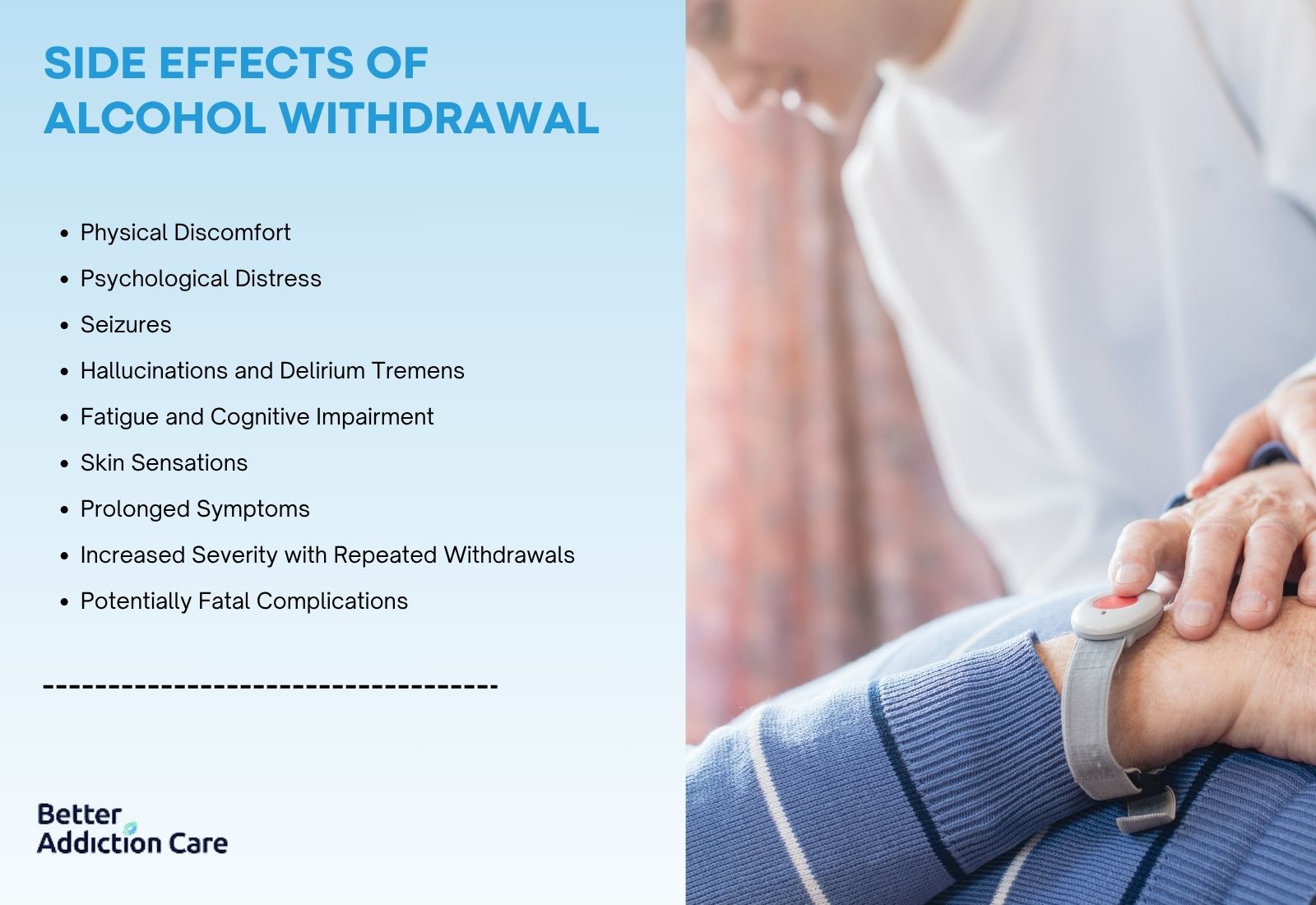
What Are Alcohol Withdrawal Symptoms?
Alcohol withdrawal symptoms include tremors, excessive sweating, persistent headaches, nausea, intense anxiety, sleep disturbances, irritability, elevated cardiovascular responses, seizures, and delirium tremens.
Below are the key symptoms of alcohol withdrawal.
Mild Symptoms
- Tremors: Rhythmical shaking of the hands and limbs that begins within six to twelve hours after the last drink as the nervous system reacts to the alcohol absence.
- Sweating: Profuse perspiration that drips from the brow and soaks clothing, reflecting an overactive sympathetic nervous system.
- Headache: Steady, pounding pain that intensifies with movement and light, arising from blood‑vessel dilation and withdrawal of alcohol’s constrictive effects.
- Nausea and Vomiting: Persistent queasiness in the stomach that leads to retching and loss of appetite, resulting from disrupted digestive‑tract regulation.
Moderate Symptoms
- Anxiety: Intense inner tension marked by racing thoughts, a sense of impending doom, and constant restlessness as stress‑response systems remain on high alert.
- Insomnia: Inability to fall asleep or maintain uninterrupted slumber, with frequent awakenings and nonrestorative sleep that leave the person fatigued the next day.
- Irritability: Quick shifts into anger or frustration even over minor frustrations, driven by an imbalance of mood‑regulating neurotransmitters.
- Elevated Heart Rate and Blood Pressure: Heart racing above 100 beats per minute and blood‑pressure readings rising well above normal ranges, creating a persistent feeling of a pounding chest.
Severe Symptoms
- Seizures: Sudden convulsions that erupt as uncontrolled bursts of electrical activity in the brain, producing full‑body shaking, stiffening of the limbs, and temporary loss of consciousness.
- Delirium Tremens: An extreme state of confusion accompanied by terrifying visual and tactile hallucinations, severe disorientation to time and place, rapid swings in heart rate, blood pressure, and body temperature, and profound risk of organ failure. According to Grover, S.’s 2018 study, ‘Delirium Tremens: Assessment and Management’, from the United States, delirium tremens occurs in approximately 0.7% of individuals with alcohol use disorders, with prevalence rates varying based on treatment setting and severity of alcohol dependence.
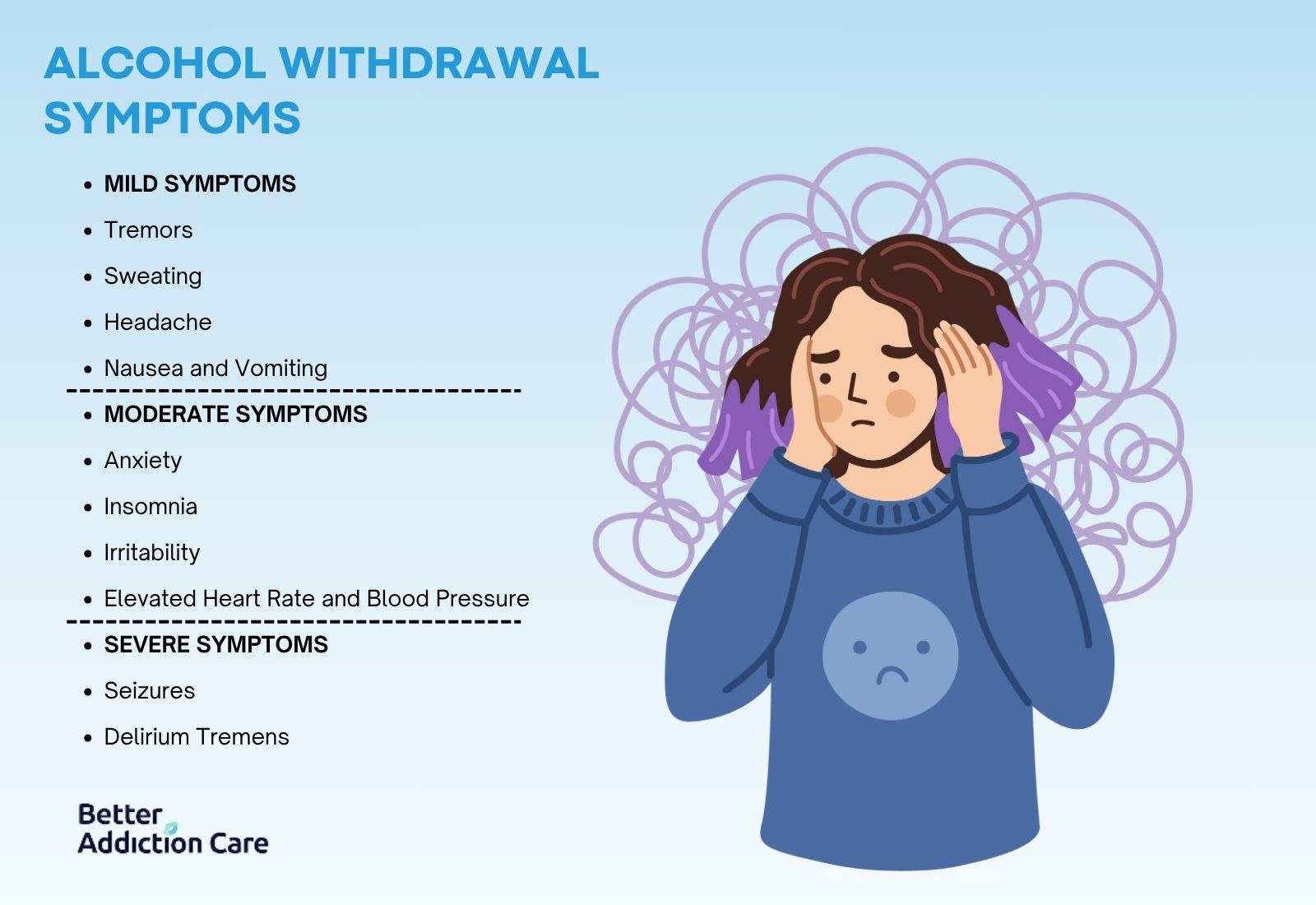
What is Alcohol Withdrawal Syndrome (AWS)?
Alcohol Withdrawal Syndrome (AWS) is a set of symptoms that occur after a person who has been drinking heavily for a prolonged period suddenly reduces or stops alcohol intake. These symptoms result from the brain and nervous system adjusting to the absence of alcohol, which it had adapted to over time. AWS includes mild symptoms such as anxiety, shakiness, sweating, nausea, and headache, as well as severe symptoms like seizures and delirium tremens, which can be life-threatening without treatment. Symptoms typically begin around 6 hours after the last drink, peak within 24 to 72 hours, and require medical management to prevent complications.
How Long Do Alcohol Withdrawal Symptoms Last?
Alcohol withdrawal symptoms last from 3 to 7 days in most cases. Mild symptoms begin within 6 to 12 hours, peak around 24 to 72 hours, and gradually improve. In some cases, people with alcohol use disorder feel anxiety, insomnia, and mood changes that continue for weeks.
How are Alcohol Withdrawal Symptoms Diagnosed?
Alcohol withdrawal symptoms are diagnosed through a combination of clinical evaluation, patient history, and standardized assessment tools.
Below are the diagnostic processes of alcohol withdrawal symptoms.
Clinical Evaluation
- Physical Examination: Doctors assess vital signs such as heart rate, blood pressure, temperature, and signs of tremors or sweating.
- Mental Status Check: Evaluation of cognitive function, mood, and orientation to detect confusion, hallucinations, or agitation.
Medical History
- Alcohol Use History: Physicians ask about the duration, quantity, and frequency of alcohol consumption.
- Previous Withdrawal Episodes: Prior experiences with withdrawal help predict severity.
- Co-occurring Conditions: Mental health disorders or other substance use can influence diagnosis and treatment.
Diagnostic Tools
-
CIWA-Ar (Clinical Institute Withdrawal Assessment for Alcohol, revised):
- A widely used scale that scores symptoms like nausea, tremors, sweating, anxiety, agitation, and hallucinations.
- Helps determine the severity of withdrawal and guide treatment decisions.
-
Blood Tests:
-
A Blood test is used to check liver function, electrolyte levels, and rule out other medical conditions.
-
Timing of Symptoms
- Symptoms begin 6–24 hours after the last drink.
- Peak severity occurs between 24–72 hours.
- Severe cases may develop delirium tremens (DTs), which can be life-threatening and require immediate medical attention
What Is The Treatment method for Alcohol Withdrawal?
Treatment for alcohol withdrawal begins with medical supervision, detox treatment, and medications in a safe setting, especially for individuals at risk of severe symptoms. Detox is the first stage of alcohol withdrawal treatment, where professionals monitor vital signs and manage symptoms such as seizures, high blood pressure, and hallucinations. Medications like benzodiazepines, antipsychotics, or anticonvulsants are used to reduce discomfort and prevent complications.
Beyond medically assisted alcohol rehab, ongoing care supports long-term recovery. This includes behavioral therapies, peer support, and relapse prevention strategies. Inpatient or outpatient treatment settings offer structured programs to address both physical and psychological dependence. For those unsure where to begin, accessing the right care starts with understanding how to get sober safely and stay on track.
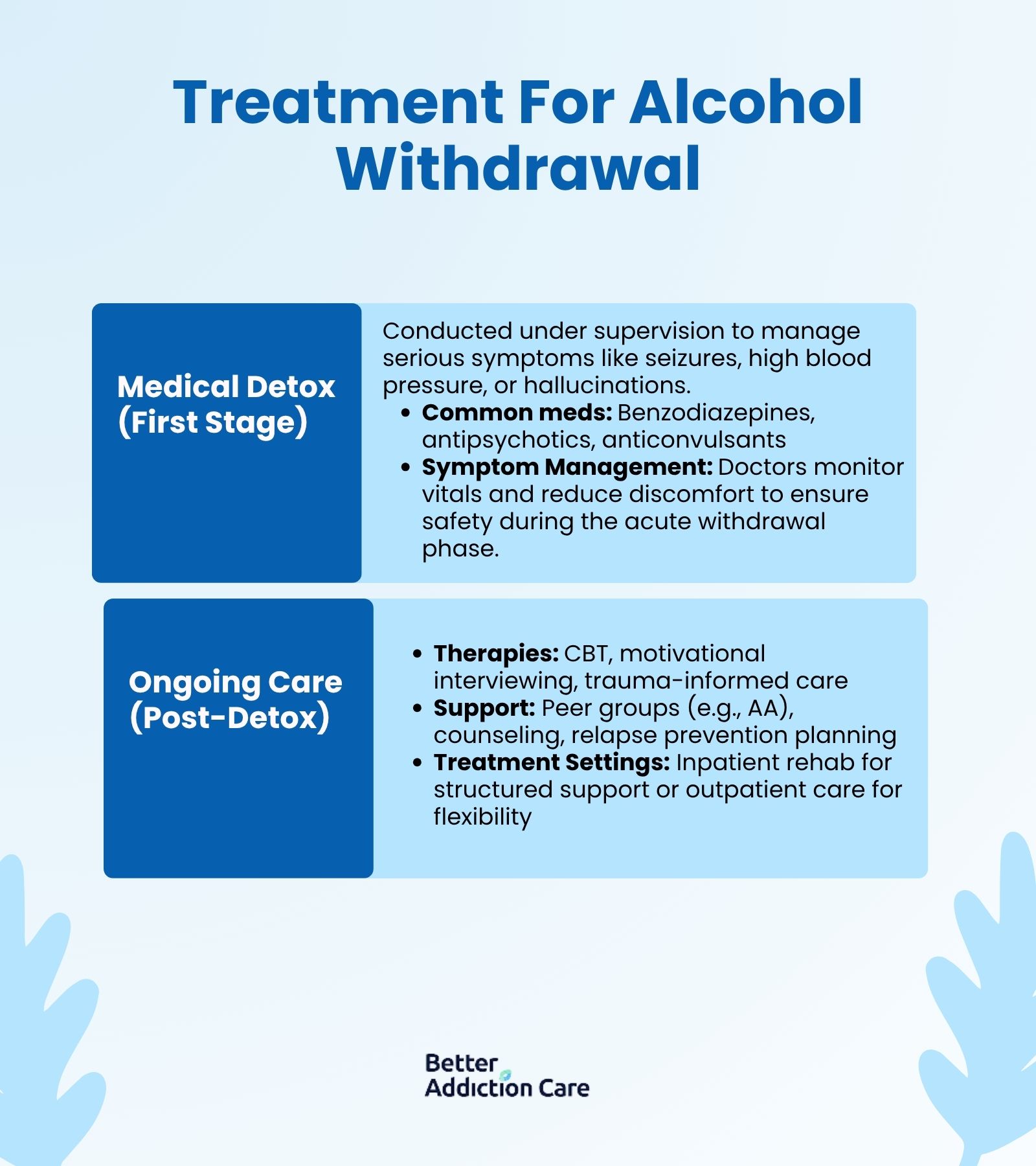
Is Alcohol Withdrawal Risky?
Yes, alcohol withdrawal is risky. Some individuals experience mild symptoms like anxiety and insomnia, while others develop severe complications such as seizures and delirium tremens (DTs), which are life-threatening without proper medical management.
Can Alcohol Withdrawal Cause Brain Damage?
No, alcohol withdrawal does not directly cause brain damage in most cases, but in severe and untreated cases, it does increase the risk.
Heavy, long-term alcohol use affects brain function, and suddenly stopping leads to symptoms that strain the brain. Severe withdrawal triggers seizures or delirium tremens, both of which are medical emergencies. One possible lingering effect is brain fog, where a person struggles with memory, focus, and mental clarity during or after withdrawal. Medical supervision helps prevent complications and supports brain recovery during detox.
Is Insomnia A Side Effect Of Alcohol Withdrawal?
Yes, insomnia is a common symptom during alcohol withdrawal, affecting over half of individuals undergoing detox. Sleep disturbances persist for weeks or months after stopping alcohol consumption. These issues arise due to changes in brain chemistry, circadian rhythm disruptions, and increased anxiety levels. According to Arnedt, J.T.’s 2007 study, ‘TREATMENT OPTIONS FOR SLEEP DISTURBANCES DURING ALCOHOL RECOVERY’, 58% of a sample of 40 alcoholic male inpatients developed insomnia during the first 6 days of acute alcohol withdrawal.
Is Diarrhea A Side Effect Of Alcohol Withdrawal?
Yes, Diarrhea is a frequent side effect during alcohol withdrawal, starting within the first 12 hours and lasting up to 48 hours. This occurs as the body readjusts to the absence of alcohol, leading to gastrointestinal disturbances.
Does Alcohol Withdrawal Stop or Exacerbate Anxiety?
Alcohol withdrawal increases anxiety. Alcohol suppresses the nervous system, but stopping use creates a rebound effect that heightens restlessness, irritability, and tension. Heavy drinkers experience stronger anxiety symptoms as the brain adjusts. Medical support helps manage these effects and keeps the process safe.
What to Do in Case of an Alcohol Withdrawal Emergency?
In case of an alcohol withdrawal emergency, call 911 immediately. Stay with the victim, keep them calm, and, if possible, monitor their vital signs. Give emergency personnel accurate information about the issue, including the person's medical history and recent alcohol consumption. Follow their instructions attentively when they arrive, as they will examine the situation and offer any necessary medical care, which involves transport to a hospital for additional treatment.
How Can You Evaluate The Best Drug Rehab Centers For Addressing Alcohol Withdrawal?
You can evaluate the best drug rehab centers for addressing alcohol withdrawal by examining their medical supervision capabilities and 24/7 monitoring services. Look for facilities with qualified medical professionals who specialize in addiction medicine and utilize evidence-based protocols for managing withdrawal symptoms safely, as alcohol withdrawal ranges from mild discomfort to life-threatening complications like seizures.
When searching for quality care, we recommend exploring options through our local alcohol rehab facility directory to find centers that meet your specific needs. The most effective rehab centers combine medically supervised detox with comprehensive treatment programs, proper accreditation, insurance acceptance, and qualified medical staff to ensure safe withdrawal management and long-term recovery success.
Related Articles
Treatment Centers in New Jersey






